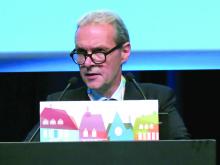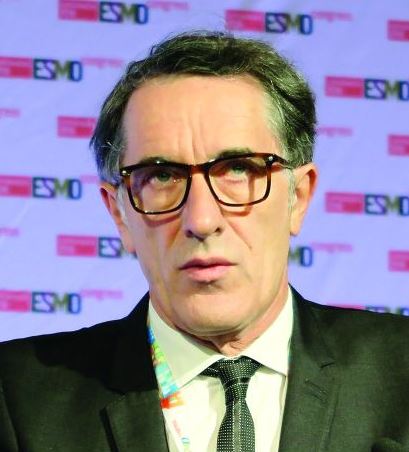User login
COPENHAGEN – In patients with high-risk locoregional clear cell renal cell (RCC) carcinoma, adjuvant therapy with sunitinib significantly prolonged disease-free survival, compared with placebo, reported investigators in a randomized, phase III trial.
Among 615 patients with clear cell RCC at high risk for recurrence following nephrectomy, the median duration of disease-free survival (DFS) by blinded central review was 6.8 years for patients treated with sunitinib (Sutent) for 1 year, compared with 5.6 years for patients assigned to placebo, reported Alain Ravaud, MD, PhD from Hôpital Saint André in Bordeaux, France.
“These results represent a major step forward in the clinical management of clear cell renal cell carcinoma,” he said at the European Society for Medical Oncology Congress.
The study was published simultaneously online in the New England Journal of Medicine.
Approximately 16% of all patients with RCC have locoregional (stage III) disease, which is associated with a 5-year survival rate of 53%. Up to 40% of patients with locoregional disease will have a relapse with metastases after nephrectomy, indicating a need for effective adjuvant therapy to reduce the risk of relapse in this population, Dr. Ravaud said.
However, to date, adjuvant therapy with either cytokines, hormones, immunotherapy, or radiotherapy has not been successful at preventing relapse, and the ASSURE trial, comparing sunitinib and sorafenib (Nexavar) with placebo showed that neither of the tyrosine kinase inhibitors (TKIs) improved survival, and each necessitated discontinuations due to toxicity, despite dose reductions, Dr. Ravaud noted.
The trial reported here, S-TRAC (Sunitinib as Adjuvant Treatment for Patients at High Risk of Recurrence of Renal Cell Carcinoma Following Nephrectomy), had different results, however.
A total of 615 patients with high-risk RCC were enrolled. High-risk disease was defined as stage T3, NO or Nx, M0, any Furhman grade and any Eastern Cooperative Oncology Group (ECOG) performance status; T4, N0 or NX, M0, any Fuhrman/ECOG status; or any T, N1-N2, M0, any Fuhrman/ECOG status.
Patients were stratified by risk groups, ECOG status, and country, then randomized to receive either sunitinib 50 mg daily or placebo on a 4 weeks–on, 2 weeks–off schedule for 1 year or until recurrence, unacceptable toxicity, or withdrawal of consent.
Central Reviewers Yes, Investigators No
As noted before, the duration of median DFS, the primary endpoint, was 14 months longer with sunitinib, translating into a hazard ratio (HR) of 0.76 (P = .03). This determination of DFS was performed by central reviewers blinded to treatment type.
However, DFS rates by investigators review, while numerically different between trial arms (6.5 years for sunitinib vs. 4.5 years in the placebo group), were not statistically significant (HR, 0.81, P = .08).
Overall survival data were not mature at the time of the data cutoff, with the median not reached in either group.
Treatment-emergent adverse events were seen in 99.7% of the patients in the sunitinib group and in 88.5% of controls. Investigators attributed adverse events to treatment in 98.4% of patients in the sunitinib arm and 75.7% of those in the placebo arm.
The most common adverse events in the sunitinib group were diarrhea, palmar-plantar erythrodysesthesia, hypertension, fatigue, and nausea.
Grade 3 or higher adverse events were reported in 194 patients (63.4%) in the sunitinib group and in 66 (21.7%) in the placebo group.
Interestingly, there were fewer dose reductions in the sunitinib group (34.3% vs. 46.4%) and fewer dose interruptions (2.0% vs. 13.2%), although more patients on sunitinib discontinued because of adverse events (28.1% vs. 5.6%).
The most common cause of death in each group was RCC, which accounted for 47 of 62 deaths (75.8%) in the sunitinib arm and 47 of 64 (73.4%) in the placebo arm. No death was attributed to treatment-associated toxicities.
Patients on sunitinib also had generally lower scores on quality of life scales, but the between-group differences did not reach the prespecified minimally important difference of 10 patients except for the domains of diarrhea and loss of appetite.
But having said that, he noted that, in S-TRAC as in ASSURE, the study was negative going by investigator rather than central review, and that the positive HR for central review in S-TRAC was near the significance boundary.
Overall, the quality of evidence supporting sunitinib in the adjuvant setting is weak, with benefits barely outweighing harms, and that the cost of the therapy, in light of the above, is high, Dr. Bex said.
He added that he would need to see mature overall survival data from S-TRAC and ASSURE, further results from other ongoing trials with sunitinib, and a positive meta-analysis of studies of vascular endothelial growth factor receptor tyrosine kinase inhibitors in the adjuvant setting before he would change his mind on the use of sunitinib and related agents.
The trial was supported by Pfizer. Dr. Ravaud and Dr. Bex disclosed consulting and research grants from Pfizer and other companies.
COPENHAGEN – In patients with high-risk locoregional clear cell renal cell (RCC) carcinoma, adjuvant therapy with sunitinib significantly prolonged disease-free survival, compared with placebo, reported investigators in a randomized, phase III trial.
Among 615 patients with clear cell RCC at high risk for recurrence following nephrectomy, the median duration of disease-free survival (DFS) by blinded central review was 6.8 years for patients treated with sunitinib (Sutent) for 1 year, compared with 5.6 years for patients assigned to placebo, reported Alain Ravaud, MD, PhD from Hôpital Saint André in Bordeaux, France.
“These results represent a major step forward in the clinical management of clear cell renal cell carcinoma,” he said at the European Society for Medical Oncology Congress.
The study was published simultaneously online in the New England Journal of Medicine.
Approximately 16% of all patients with RCC have locoregional (stage III) disease, which is associated with a 5-year survival rate of 53%. Up to 40% of patients with locoregional disease will have a relapse with metastases after nephrectomy, indicating a need for effective adjuvant therapy to reduce the risk of relapse in this population, Dr. Ravaud said.
However, to date, adjuvant therapy with either cytokines, hormones, immunotherapy, or radiotherapy has not been successful at preventing relapse, and the ASSURE trial, comparing sunitinib and sorafenib (Nexavar) with placebo showed that neither of the tyrosine kinase inhibitors (TKIs) improved survival, and each necessitated discontinuations due to toxicity, despite dose reductions, Dr. Ravaud noted.
The trial reported here, S-TRAC (Sunitinib as Adjuvant Treatment for Patients at High Risk of Recurrence of Renal Cell Carcinoma Following Nephrectomy), had different results, however.
A total of 615 patients with high-risk RCC were enrolled. High-risk disease was defined as stage T3, NO or Nx, M0, any Furhman grade and any Eastern Cooperative Oncology Group (ECOG) performance status; T4, N0 or NX, M0, any Fuhrman/ECOG status; or any T, N1-N2, M0, any Fuhrman/ECOG status.
Patients were stratified by risk groups, ECOG status, and country, then randomized to receive either sunitinib 50 mg daily or placebo on a 4 weeks–on, 2 weeks–off schedule for 1 year or until recurrence, unacceptable toxicity, or withdrawal of consent.
Central Reviewers Yes, Investigators No
As noted before, the duration of median DFS, the primary endpoint, was 14 months longer with sunitinib, translating into a hazard ratio (HR) of 0.76 (P = .03). This determination of DFS was performed by central reviewers blinded to treatment type.
However, DFS rates by investigators review, while numerically different between trial arms (6.5 years for sunitinib vs. 4.5 years in the placebo group), were not statistically significant (HR, 0.81, P = .08).
Overall survival data were not mature at the time of the data cutoff, with the median not reached in either group.
Treatment-emergent adverse events were seen in 99.7% of the patients in the sunitinib group and in 88.5% of controls. Investigators attributed adverse events to treatment in 98.4% of patients in the sunitinib arm and 75.7% of those in the placebo arm.
The most common adverse events in the sunitinib group were diarrhea, palmar-plantar erythrodysesthesia, hypertension, fatigue, and nausea.
Grade 3 or higher adverse events were reported in 194 patients (63.4%) in the sunitinib group and in 66 (21.7%) in the placebo group.
Interestingly, there were fewer dose reductions in the sunitinib group (34.3% vs. 46.4%) and fewer dose interruptions (2.0% vs. 13.2%), although more patients on sunitinib discontinued because of adverse events (28.1% vs. 5.6%).
The most common cause of death in each group was RCC, which accounted for 47 of 62 deaths (75.8%) in the sunitinib arm and 47 of 64 (73.4%) in the placebo arm. No death was attributed to treatment-associated toxicities.
Patients on sunitinib also had generally lower scores on quality of life scales, but the between-group differences did not reach the prespecified minimally important difference of 10 patients except for the domains of diarrhea and loss of appetite.
But having said that, he noted that, in S-TRAC as in ASSURE, the study was negative going by investigator rather than central review, and that the positive HR for central review in S-TRAC was near the significance boundary.
Overall, the quality of evidence supporting sunitinib in the adjuvant setting is weak, with benefits barely outweighing harms, and that the cost of the therapy, in light of the above, is high, Dr. Bex said.
He added that he would need to see mature overall survival data from S-TRAC and ASSURE, further results from other ongoing trials with sunitinib, and a positive meta-analysis of studies of vascular endothelial growth factor receptor tyrosine kinase inhibitors in the adjuvant setting before he would change his mind on the use of sunitinib and related agents.
The trial was supported by Pfizer. Dr. Ravaud and Dr. Bex disclosed consulting and research grants from Pfizer and other companies.
COPENHAGEN – In patients with high-risk locoregional clear cell renal cell (RCC) carcinoma, adjuvant therapy with sunitinib significantly prolonged disease-free survival, compared with placebo, reported investigators in a randomized, phase III trial.
Among 615 patients with clear cell RCC at high risk for recurrence following nephrectomy, the median duration of disease-free survival (DFS) by blinded central review was 6.8 years for patients treated with sunitinib (Sutent) for 1 year, compared with 5.6 years for patients assigned to placebo, reported Alain Ravaud, MD, PhD from Hôpital Saint André in Bordeaux, France.
“These results represent a major step forward in the clinical management of clear cell renal cell carcinoma,” he said at the European Society for Medical Oncology Congress.
The study was published simultaneously online in the New England Journal of Medicine.
Approximately 16% of all patients with RCC have locoregional (stage III) disease, which is associated with a 5-year survival rate of 53%. Up to 40% of patients with locoregional disease will have a relapse with metastases after nephrectomy, indicating a need for effective adjuvant therapy to reduce the risk of relapse in this population, Dr. Ravaud said.
However, to date, adjuvant therapy with either cytokines, hormones, immunotherapy, or radiotherapy has not been successful at preventing relapse, and the ASSURE trial, comparing sunitinib and sorafenib (Nexavar) with placebo showed that neither of the tyrosine kinase inhibitors (TKIs) improved survival, and each necessitated discontinuations due to toxicity, despite dose reductions, Dr. Ravaud noted.
The trial reported here, S-TRAC (Sunitinib as Adjuvant Treatment for Patients at High Risk of Recurrence of Renal Cell Carcinoma Following Nephrectomy), had different results, however.
A total of 615 patients with high-risk RCC were enrolled. High-risk disease was defined as stage T3, NO or Nx, M0, any Furhman grade and any Eastern Cooperative Oncology Group (ECOG) performance status; T4, N0 or NX, M0, any Fuhrman/ECOG status; or any T, N1-N2, M0, any Fuhrman/ECOG status.
Patients were stratified by risk groups, ECOG status, and country, then randomized to receive either sunitinib 50 mg daily or placebo on a 4 weeks–on, 2 weeks–off schedule for 1 year or until recurrence, unacceptable toxicity, or withdrawal of consent.
Central Reviewers Yes, Investigators No
As noted before, the duration of median DFS, the primary endpoint, was 14 months longer with sunitinib, translating into a hazard ratio (HR) of 0.76 (P = .03). This determination of DFS was performed by central reviewers blinded to treatment type.
However, DFS rates by investigators review, while numerically different between trial arms (6.5 years for sunitinib vs. 4.5 years in the placebo group), were not statistically significant (HR, 0.81, P = .08).
Overall survival data were not mature at the time of the data cutoff, with the median not reached in either group.
Treatment-emergent adverse events were seen in 99.7% of the patients in the sunitinib group and in 88.5% of controls. Investigators attributed adverse events to treatment in 98.4% of patients in the sunitinib arm and 75.7% of those in the placebo arm.
The most common adverse events in the sunitinib group were diarrhea, palmar-plantar erythrodysesthesia, hypertension, fatigue, and nausea.
Grade 3 or higher adverse events were reported in 194 patients (63.4%) in the sunitinib group and in 66 (21.7%) in the placebo group.
Interestingly, there were fewer dose reductions in the sunitinib group (34.3% vs. 46.4%) and fewer dose interruptions (2.0% vs. 13.2%), although more patients on sunitinib discontinued because of adverse events (28.1% vs. 5.6%).
The most common cause of death in each group was RCC, which accounted for 47 of 62 deaths (75.8%) in the sunitinib arm and 47 of 64 (73.4%) in the placebo arm. No death was attributed to treatment-associated toxicities.
Patients on sunitinib also had generally lower scores on quality of life scales, but the between-group differences did not reach the prespecified minimally important difference of 10 patients except for the domains of diarrhea and loss of appetite.
But having said that, he noted that, in S-TRAC as in ASSURE, the study was negative going by investigator rather than central review, and that the positive HR for central review in S-TRAC was near the significance boundary.
Overall, the quality of evidence supporting sunitinib in the adjuvant setting is weak, with benefits barely outweighing harms, and that the cost of the therapy, in light of the above, is high, Dr. Bex said.
He added that he would need to see mature overall survival data from S-TRAC and ASSURE, further results from other ongoing trials with sunitinib, and a positive meta-analysis of studies of vascular endothelial growth factor receptor tyrosine kinase inhibitors in the adjuvant setting before he would change his mind on the use of sunitinib and related agents.
The trial was supported by Pfizer. Dr. Ravaud and Dr. Bex disclosed consulting and research grants from Pfizer and other companies.
AT ESMO 2016
Key clinical point: S-TRAC is the first clinical trial to show a benefit of adjuvant drug therapy in renal cell carcinoma.
Major finding: The median duration of disease-free survival by central review was 6.8 years for patients randomized to sunitinib vs. 5.6 years for those randomized to placebo.
Data source: Phase III trial of adjuvant therapy following nephrectomy in 615 patients with high-risk clear cell RCC.
Disclosures: The trial was supported by Pfizer. Dr. Ravaud and Dr. Bex disclosed consulting and research grants from Pfizer and other companies.


